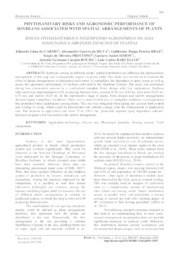Phytosanitary risks and agronomic performance of soybeans associated with spatial arrangements of plants.
Phytosanitary risks and agronomic performance of soybeans associated with spatial arrangements of plants.
Author(s): CARMO, E. L. do; SILVA, A. G.; BRAZ, G. B. P.; PROCOPIO, S. de O.; SIMON, G. A.; ROCHA, A. G. C.; BARCELLOS, L. C.
Summary: Abstract: Soybeans sowing in different plants? spatial distribution can influence the phytosanitary management of this crop and, consequently, impact on grains yield. This study was carried out to evaluate the effect of plants arrangements on infestation and control of caterpillars, the deposition of spray syrup as well as assess the agronomic performance of soybean cultivated in the Brazilian Cerrado. The assay was performed during two consecutive seasons in a randomized complete block design with four replications. Soybean cultivation was implemented in 0.50 m spacing between rows, crossed (0.50 m x 0.50 m), twin rows (0.25 m / 0.75 m), and narrow (0.25 m). In the reproductive stage of plants, both crossed and narrow arrangements showed higher caterpillars? incidence. There was a more evident risk of caterpillar incidence in arrangements that promoted better equidistance among plants. This risk was mitigated when taking into account both control and overlap of syrup, which could be incremented into inferior canopy with the enhancement of application rate. The increase in application rate from 75 to 150 L ha-1 promoted superior spray deposition volumes. Increases in grain yield was noted in the narrow arrangement.
Publication year: 2019
Types of publication: Journal article
Unit: Embrapa Environment
Observation
Some of Embrapa's publications are published as ePub files. To read them, use or download one of the following free software options to your computer or mobile device. Android: Google Play Books; IOS: iBooks; Windows and Linux: Calibre.
Access other publications
Access the Agricultural Research Database (BDPA) to consult Embrapa's full library collection and records.
Visit Embrapa Bookstore to purchase books and other publications sold by Embrapa.

